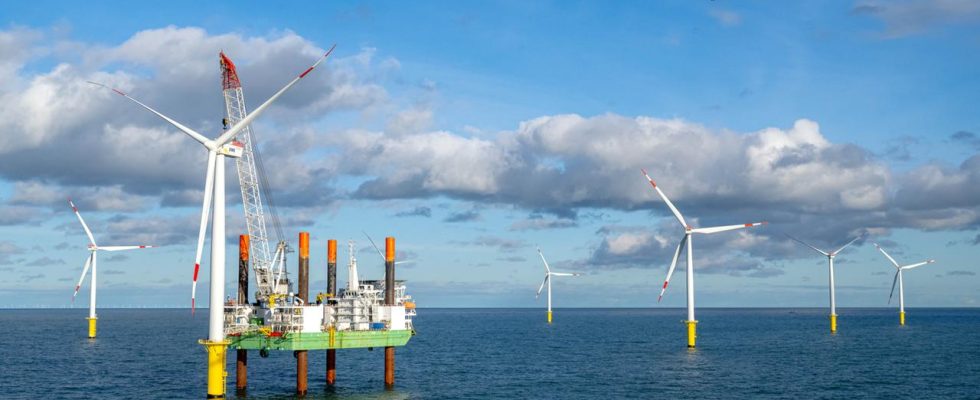The federal government wants to cut several million dollars for marine protection and fisheries and to change the legal requirements retroactively. The farmers’ protests also play a role. Environmentalists and fishermen protest.
Last year, the federal government collected several billion euros from the auction of areas in the Baltic and North Seas for offshore wind farms. The use of the funds is regulated by law. A large part of the proceeds is used to reduce electricity costs, five percent must be used for marine nature conservation and the promotion of environmentally friendly fishing.
As part of the planned austerity measures, the federal government now wants to change that and use part of this income for other purposes. Farmers, among others, benefit from this. Legal and political questions arise.
Expansion of offshore wind farms
In spring 2022, the federal government presented its so-called Easter package for the expansion of renewable energies. One part of the measures: the expansion of wind power at sea should be significantly accelerated. In order to increase acceptance, the reformed Wind Energy at Sea Act (WindSeeG) should also strengthen nature conservation and fishing concerns.
Part of the money raised from the auctions of offshore areas should be earmarked for this purpose in the future. Ten percent for the so-called marine nature conservation component, ten percent for the fisheries component. This is what the federal government’s draft law envisaged. The law was passed by the Bundestag in the summer of 2022; However, both components were reduced to five percent each.
Earmarked funds
In accordance with the legal regulation, the Federal Network Agency announced in its tender for 2023: “90 percent of the proceeds from the offshore tenders will flow into reducing electricity costs and five percent each into marine nature conservation and the promotion of environmentally friendly fishing.” Participation in the bidding process was large, around 13.3 billion euros were raised in 2023. This means that around 670 million euros are available each for fisheries and marine nature conservation.
The Federal Ministry of Agriculture and the Federal Ministry of the Environment are responsible for implementing the corresponding measures. When the question arose after the Federal Constitutional Court’s budget ruling in November as to whether savings could be made here too, both ministries referred to the statutory earmarking of the money. They also emphasized that the money would be used to protect marine nature, which is affected by the construction of the wind turbines and requires the support of Baltic Sea fishermen, for example.
Savings measures according to BVerfG ruling
But shortly afterwards, in December, Chancellor Olaf Scholz, Economics Minister Robert Habeck and Finance Minister Christian Lindner agreed on an austerity package. Of the approximately 1.34 billion euros that the law says are due for marine nature conservation and fishing from the 2023 auctions, 500 million euros should be used for other purposes.
Last week, after the planned reduction in subsidies for farmers was partially withdrawn, it was already 780 million euros.
Retroactive rezoning possible?
But is this legally possible? Can the earmarking of the funds be changed retroactively? When asked about this, the federal government reacted narrowly. Only after repeated inquiries did a spokesman for the Ministry of Economic Affairs (BMWK) say: “As usual, the BMWK examined the planned change intensively beforehand and formulated a legally possible change to the law.”
The government’s draft law on this is currently being discussed by the Bundestag. Specifically, he plans to reduce the fishing component to one percent, and the marine nature conservation component to be reduced from the current five percent to 3.1 percent.
Instead of 670 million euros, the Ministry of the Environment should receive 420 million euros for marine nature conservation. For fisheries, the Ministry of Agriculture should receive 134 million instead of 670 million euros from the proceeds of the offshore auctions. However, 25 million euros of this are earmarked for expenses that were originally supposed to be financed through the regular budget. This leaves 109 million euros for environmentally friendly fishing.
Environmental aid: “A huge scandal”
Sascha Müller-Kraenner, Federal Managing Director of German Environmental Aid, mentioned the planned cuts in an interview with ARD capital studio a “huge scandal”. He accuses the federal government of restructuring the federal budget at the expense of nature conservation.
At the same time, he admits: Environmental Aid itself will not be able to sue. These are the results of an initial test. However, says Müller-Kraenner, he hopes that the operators of the offshore systems will “take another legal look at it.” Especially since the money was intended to compensate for the interference with nature.
Peter Breckling, managing director of the Association of German Cutter and Coastal Fishermen, speaks of a serious blow to the fishery. He points out that fishing is not allowed in offshore wind farms and that more and more fishing areas are being lost. The amount that is now earmarked for fishing is “not adequate compensation for what German fishing is losing in the North and Baltic Seas.” The perception in the fishing sector is that they are the pawns when it comes to austerity measures. He also hopes for a legal review or for politicians to give in.
Resistance from the countries
There could also be resistance from the countries. Mecklenburg-Western Pomerania’s Environment Minister Till Backhaus (SPD) had last year promised support to the fishermen and referred to the 670 million euros. Upon request, he shares this ARD capital studio with: He had “great hopes” for the use of these funds. He calls the changes now presented a “drastic cut”. He “considers this to be a fatal signal to the industry, which has been badly hit and is under threat to its existence, especially in the Baltic Sea.”
The reform of the offshore wind energy law and thus the earmarking of the funds should be decided by the Bundestag by the end of January. Discussions are currently underway.
Philipp Eckstein, ARD Berlin, tagesschau, January 11, 2024 10:31 a.m

